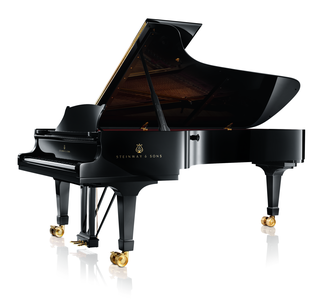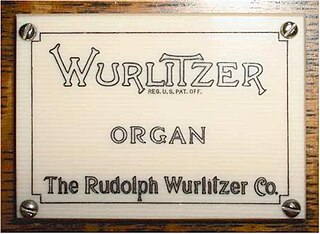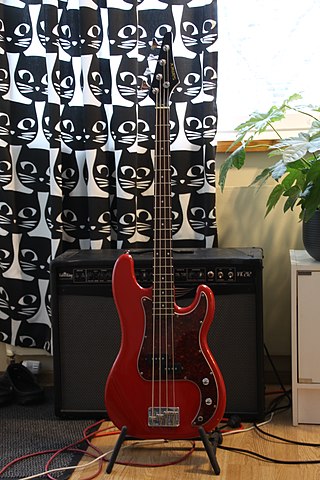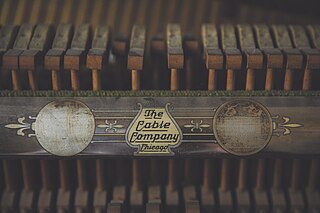
Steinway & Sons, also known as Steinway, is a German-American piano company, founded in 1853 in Manhattan by German piano builder Heinrich Engelhard Steinweg. The company's growth led to the opening of a factory in New York City, United States, and later a factory in Hamburg, Germany. The factory in the Queens borough of New York City supplies the Americas, and the factory in Hamburg supplies the rest of the world.
GTV is a commercial television station in Melbourne, Australia, owned by the Nine Network. The station is currently based at studios at 717 Bourke Street, Docklands.

Richmond is an inner-city suburb in Melbourne, Victoria, Australia, 3 km (1.9 mi) east of the Melbourne central business district, located within the City of Yarra local government area. Richmond recorded a population of 28,587 at the 2021 census, with a median age of 34.

The Rudolph Wurlitzer Company, usually referred to as simply Wurlitzer, is an American company started in Cincinnati in 1853 by German immigrant (Franz) Rudolph Wurlitzer. The company initially imported stringed, woodwind and brass instruments from Germany for resale in the United States. Wurlitzer enjoyed initial success, largely due to defense contracts to provide musical instruments to the U.S. military. In 1880, the company began manufacturing pianos and eventually relocated to North Tonawanda, New York. It quickly expanded to make band organs, orchestrions, player pianos and pipe or theatre organs popular in theatres during the days of silent movies.

Akubra is an Australian hat manufacturer owned by Tattarang since November 2023. The company is associated with bush hats made of rabbit fur felt with wide brims that are worn in rural Australia. The term "Akubra" is sometimes used to refer to any hat of this kind, however the company manufactures a wide range of hat styles including fedora, homburg, bowler, pork pie, and trilby.
HDC YoungChang is a South Korean manufacturer of pianos and industrial wood working machinery, headquartered in Incheon, South Korea. Young Chang currently holds 50% of the South Korean piano market. The company is among the largest and most automated of the world's piano manufacturers.

Samick Musical Instruments Co., Ltd. is a South Korean musical instrument manufacturer. Founded in 1958 as Samick Pianos, it is now one of the world's largest musical instrument manufacturers and an owner of shares in several musical instrument manufacturing companies.
Heintzman & Co. is a celebrated Canadian piano manufacturer, formerly based in the Toronto area, whose instruments retain a reputation for quality of workmanship and fineness of tone.
Joseph J. Pramberger (1938–2003) was a piano engineer/designer and the founder of the Pramberger Piano Company.

Sohmer & Co. was a piano manufacturing company founded in New York City in 1872. Sohmer & Co. marketed the first modern baby grand piano, and also manufactured pianos with aliquot stringing and bridge agraffes, as well as Cecilian "all-inside" player pianos and Welte-Mignon-Licensee reproducing pianos. Sohmer pianos were owned by U.S. President Calvin Coolidge, and composers Victor Herbert and Irving Berlin. Sohmer is now a line of pianos manufactured by Samick Music Corporation in Korea.

Duo-Art was one of the leading reproducing piano technologies of the early 20th century, the others being American Piano Company (Ampico), introduced in 1913 too, and Welte-Mignon in 1905. These technologies flourished at that time because of the poor quality of the early Phonograph. Between 1913 and 1925 a number of distinguished classical and popular pianists, such as Ignace Paderewski, Josef Hofmann, Percy Grainger, Teresa Carreño, Aurelio Giorni, Robert Armbruster and Vladimir Horowitz, recorded for Duo-Art, and their rolls are a legacy of 19th-century and early 20th-century aesthetic and musical practice. The recording process – using a piano wired to a perforating machine – was unable to capture the pianist's dynamics automatically. These were added by a recording technician, who manipulated hand controls to notate the dynamics onto the recording 'master'. Thus, post-recording editing was required to produce the finished performance – usually a joint effort by the recording technician and the actual pianist, who approved the final product. Thus, these recordings do represent the overall style of these great artists and are a good representation of their live performances.
Beale Piano is a brand of pianos which was formerly manufactured in Sydney, Australia.

Wertheim is a brand of domestic vacuum cleaners and floor care products.

A substantial car industry was created in Australia in the 20th century through the opening of Australian plants by international manufacturers. The first major carmaker was Ford Australia and the first Australian-designed mass production car was manufactured by Holden in 1948. Australian manufacture of cars rose to a maximum of almost half a million in the 1970s and still exceeded 400,000 in 2004. Australia was best known for the design and production of 'large' sized passenger vehicles. By 2009 total production had fallen to around 175,000 and the Australian market was dominated by cars imported from Asia and Europe.

Grotrian-Steinweg, known as Grotrian in the US, is a German manufacturer of prestige pianos. The company is based in Braunschweig, Germany, commonly known as Brunswick in English. Grotrian-Steinweg makes premium grand pianos and upright pianos.

The Cable Company was an American manufacturer and distributor of pianos and reed organs that operated independently from 1880 to 1936.
The Weber Piano Company is a former piano manufacturing company based in New York City and East Rochester, New York from the middle of the 19th century through the beginning of the 20th century, and continued as a division of Aeolian-American at East Rochester, New York until 1985, when Aeolian went out of business.

Meadowbank Manufacturing Company was an Australian manufacturer in Meadowbank, New South Wales.
Rupert Carl Wertheim was an Australian tennis player.

Sohmer and Company Piano Factory is a historic piano factory located in the Astoria neighborhood of Queens, New York City. It was built in 1886 by Sohmer & Co., and is a six-story, L-shaped, Rundbogenstil / Romanesque Revival style brick building. The corner features a clock tower with a copper trimmed mansard roof. The building was expanded about 1906–1907. It was converted to residential usage starting in 2007.















